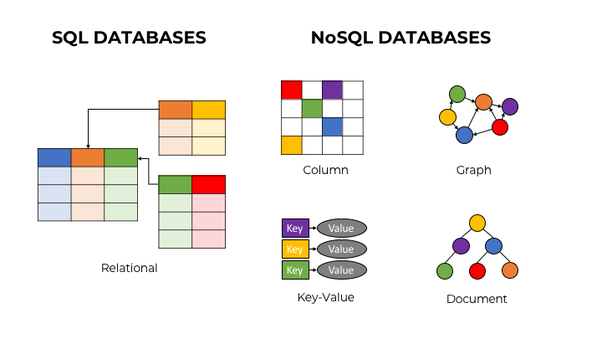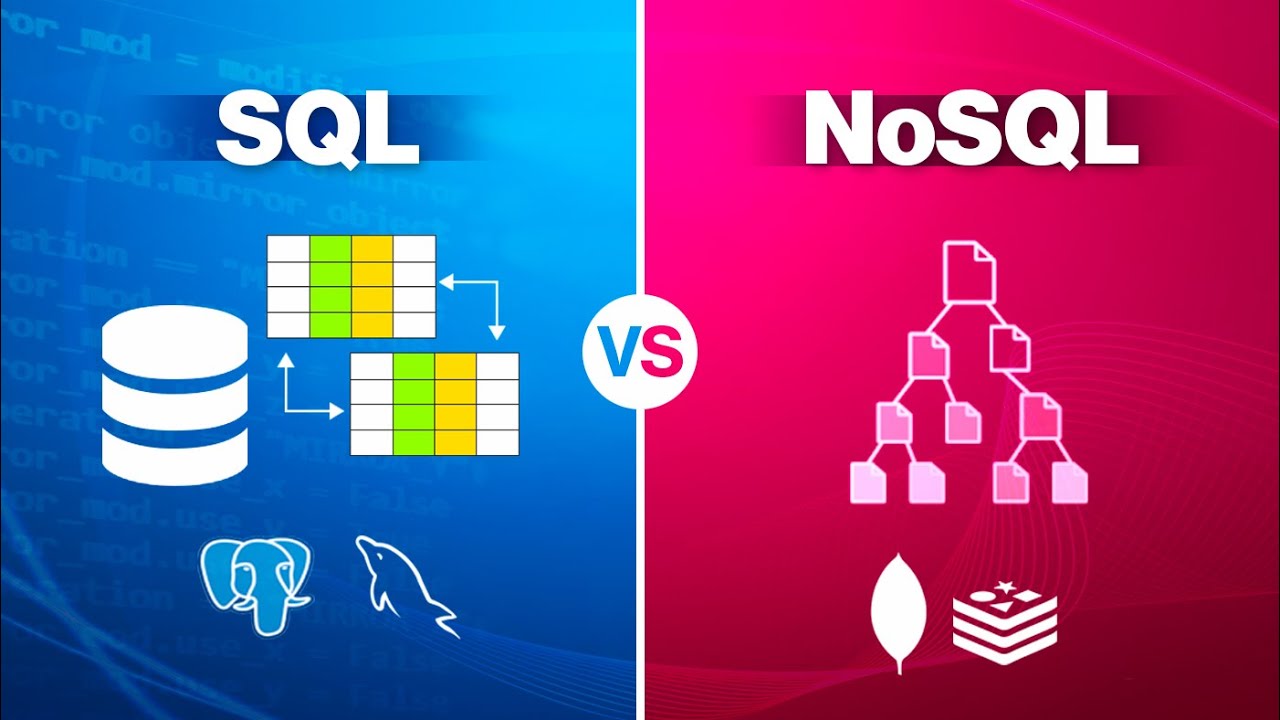When it comes to choosing a database the biggest decision is picking a relational (SQL) or non-relational (NoSQL) data structure. While both the databases are viable options still there are certain key differences between the two that users must keep in mind when making a decision.

What is SQL?
Basically, there are two main database types from which you can choose, SQL and NoSQL. Databases are an important part of applications, but the key question that arises is which type is the right option for your needs. In this article, you will see about SQL and NoSQL, how they compare at some basic points, and finally, general guidelines on when you should use each of them.
Structured Query Language, or SQL for short, is a language that allows you to manage relational databases and perform a wide range of activities on the data they contain. A relational database is a collection of data items that are linked together in a predefined relationship. These are arranged in tables where there are columns and rows, and SQL enables you to insert, update, delete, and search database records. Popular relational database management systems such as Oracle Database, MySQL, PostgreSQL, and Microsoft SQL Server use SQL to perform specific database operations.
What is NoSQL?
Not just SQL, or NoSQL as it is widely known, is an alternative database design method for relational databases. In a NoSQL database, you are not bound by a relational schema or structure because the data is not stored in the table as it is in the relational database. NoSQL databases provide flexible schemas and do not have a specific format but can be divided into four categories based on their data model.
There are 4 types of NoSQL databases. Each is suitable for a different job.
- Key/Value – most basic
- Document – offers different types of data
- Graph – stores connections like social media posts
- Column – switches how data is stored
The main difference between NoSQL and SQL databases
Scaling
SQL databases can be scaled vertically, which means that as the load increases it can be moved to a larger server with more RAM, CPU, or SSD to handle the extra capacity. As the capacity of the database increases, a single server needs to be scaled up continuously.
On the other hand, due to their flexible structure, NoSQL databases can be scaled horizontally. This means that additional load can be shared and handled by adding more servers rather than scaling a single server.
NoSQL can scale databases infinitely, making them useful for big data storage. Companies like Google, Amazon, and Facebook have created their own NoSQL databases because they cannot scale their relational databases vertically over time.
Schema
As we discussed earlier, SQL databases store structured and organized data in tables while NoSQL generally does not.
This makes SQL databases useful for data with multi-row transactions and relational structures such as accounting or legacy systems.
NoSQL databases are less rigid, so they can be used for any type of data that does not rely heavily on relational structures. They are best used for hierarchical data structures.
Technologies
Lots of choices to choose from for both SQL and NoSQL databases. Here are some examples:
SQL Databases:
- MySQL
- PostgreSQL
- Oracle
- Microsoft SQL Server
NoSQL Databases:
- MongoDB Atlas
- Cassandra
- HBase
- Redis
- Amazon DynamoDB
Standardized Language
SQL databases use SQL to perform complex queries to retrieve or manipulate data. SQL is a widely used and easy-to-learn language that is used even by non-programming people. The standardization of SQL across all SQL databases makes it an accessible platform for anyone to learn and use.
NoSQL databases are not suitable for complex queries because each data is stored and used in different ways. Its unstructured schema makes it difficult to have a standardized method/language that can formulate complex queries and be uniform across all databases.
Query Speed
Data is denormalized in NoSQL databases. This means that the information needed for a particular query is often stored together, resulting in faster results. On the other hand, in a SQL database, the required data may reside in multiple tables. Therefore, if you have a large data volume and the information you need spans multiple tables, the query results become more complex and time-consuming.
Community
SQL databases are well established and have managed to build a large community throughout the year that provides quality documentation and support. Although NoSQL databases, from a community perspective, still do not have SQL, they are becoming more popular and creating their own dedicated user base.
Learning Curve
SQL is one of the most widely used programming languages worldwide. Its syntax consists of simple English words that are easy to learn. With SQL, you can easily and efficiently manage and perform tasks in any relational database. In contrast, there is no standard language for searching NoSQL databases. There are differences in syntax between different database platforms that extend the learning curve and make it difficult to find the specialist staff on the NoSQL platform you use.
When To Use Each Technology
Before you decide which database solution to implement, you need to thoroughly examine what your current needs are but also anticipate your future needs. Many options in the market can solve your problems and meet your expectations, but in an evolving landscape, you need to be flexible, stay up-to-date with the latest technology developments and always look for the best solution for you.
General Guidelines for Using SQL
When your data is highly structured and easy to organize, SQL-based databases are the most reasonable choice. An optimized database schema allows you to reduce data duplication and ultimately improve data quality.
SQL is preferred when your application requires a high level of data integrity, consistency, and ACID compliance. Relational databases ensure that queries return reliable results and that data is not accidentally lost, which is important when dealing with sensitive information.
When you work with complex queries that need to be run against structured data, SQL databases are more useful in this regard because they can join data from multiple tables, making processing complex queries more reliable. Furthermore, the SQL language is more standardized and easier to use, so you can perform advanced queries that would otherwise be difficult.
When you have a fixed amount of data that you don’t expect to change drastically, and your data structure doesn’t change often, SQL-based databases are the safest choice.
General Guidelines for Using NoSQL
When you need to manage different data formats, NoSQL databases are a good choice. They can handle unstructured or semi-structured data that is not suitable for relational databases.
When you expect rapid data growth, NoSQL has your back. NoSQL databases give you the flexibility to handle the sudden growth of your application. Similarly, if you need to reduce the scale, it is easier with a NoSQL database solution.
When data integrity and ACID compliance are not prerequisites for your project, and you favor high performance with low latency, which is very common in areas such as instant messaging applications, NoSQL is more suitable.
When you expect your requirements to change, NoSQL’s flexible schemas allow you to change faster and more efficiently. You can add new features to your app seamlessly without much hassle.
Finality
When starting a new project, choosing the right database is a big decision. There are no fast rules for which technology to use because every situation is different. Regardless, you should do your research, understand the pros and cons of each solution, and make the most informed decision based on your needs. To meet the complex requirements of modern projects, it is not uncommon to implement both database systems.

